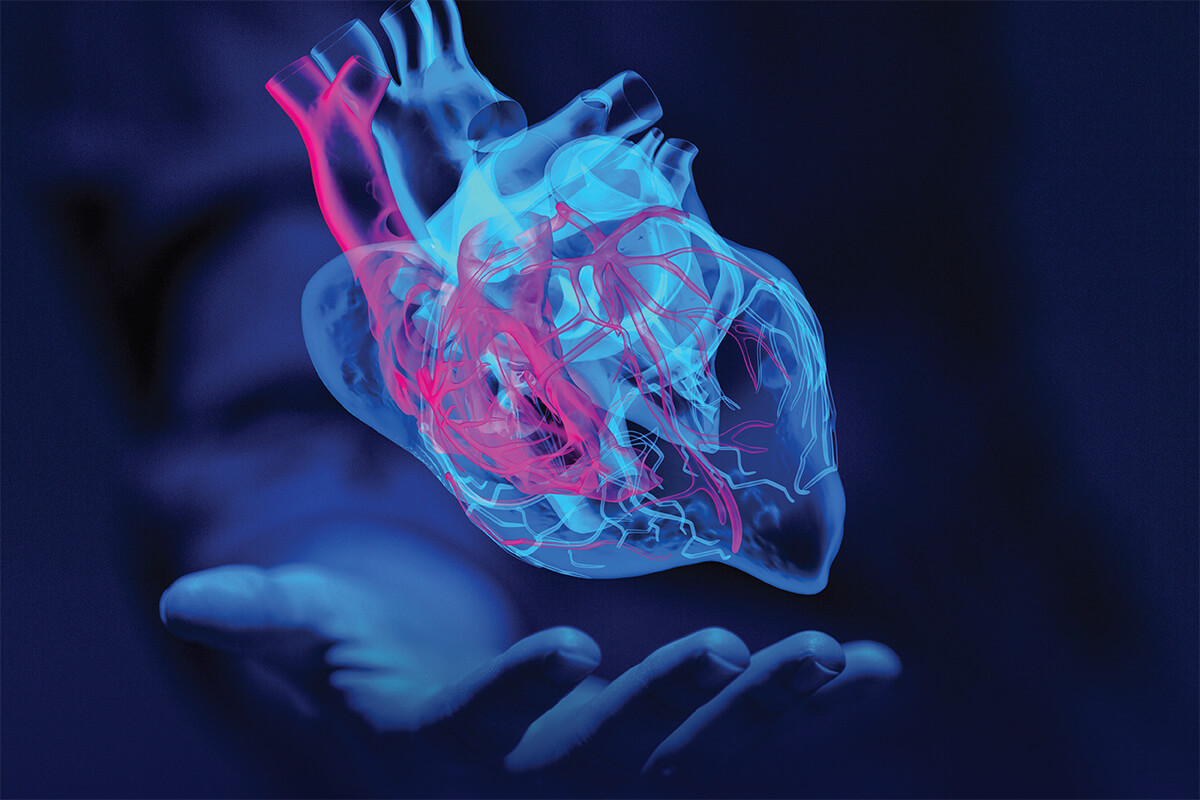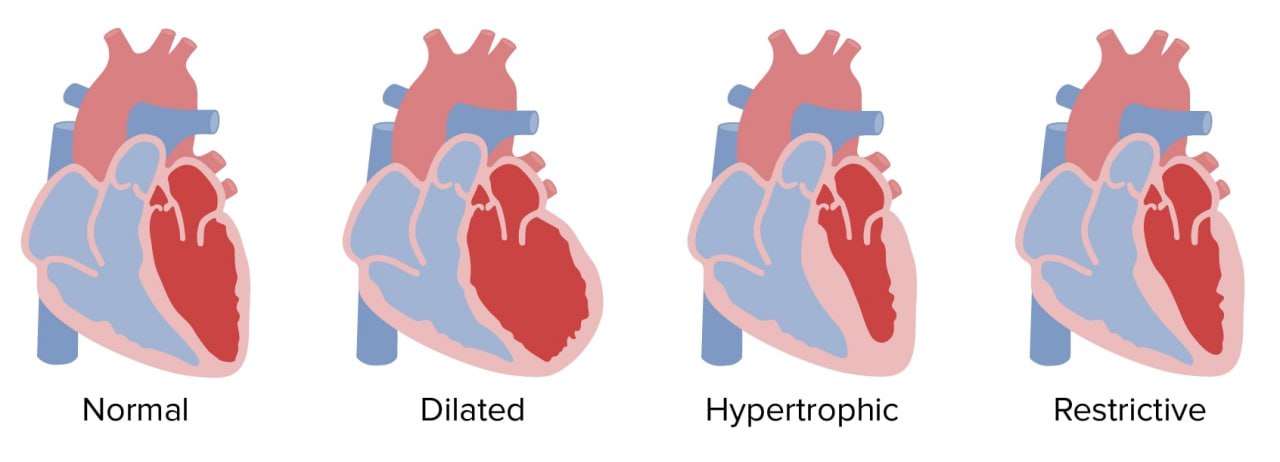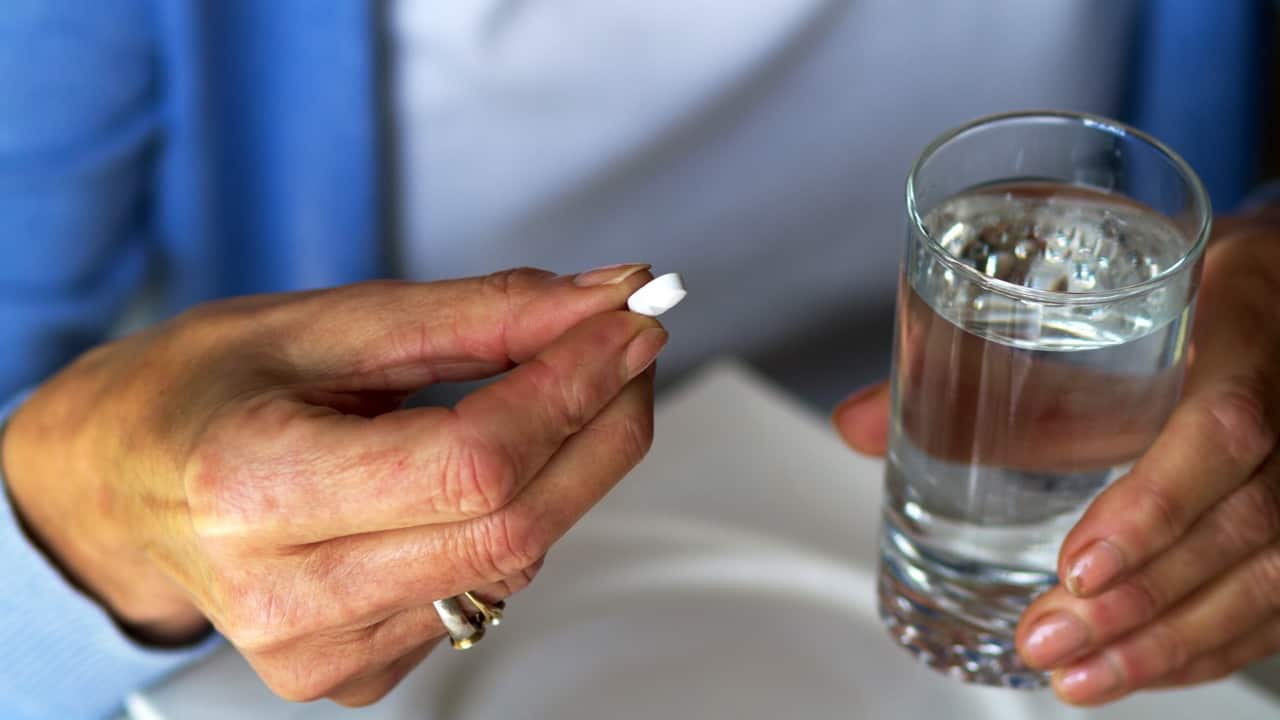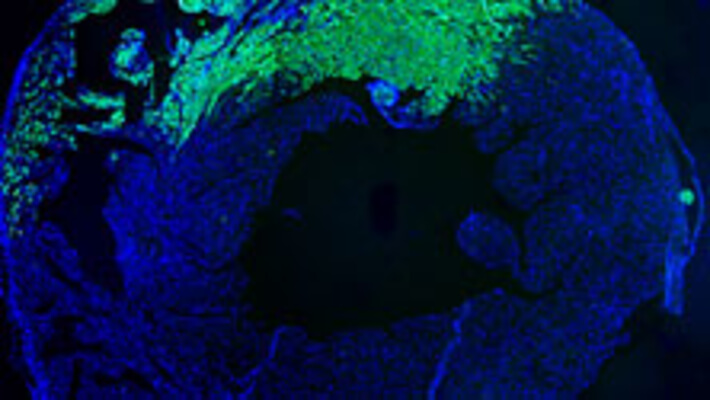Calls for Ukraine
Calls for Europe
Calls for USA

According to the World Health Organization (WHO), cardiomyopathy kills more than 1 million people worldwide every year. Despite the active development of the medical industry, standard methods of treating this heart disease and its complications are still not effective enough. Therefore, at present, the attention of scientists is focused on new approaches that could restore damaged myocardial tissue, and the most promising of them is stem cell therapy.
Cardiomyopathy is a group of cardiac diseases that are characterized by changes in the structure and functioning of the myocardium (heart muscle). For various reasons, it can thicken, become less elastic and lose its contractile function. This negatively affects the ability of the heart to pump blood around the body. Some of the most dangerous consequences of cardiomyopathy are heart rhythm disturbances, heart failure, and death due to cardiac arrest.
There are four types of the disease. Each of them has its own causes, symptoms and treatments.

The most common form of the disease. Often occurs as a result of limited blood flow to the heart muscle (ischemia). It is characterized by weakening and thinning of the walls of the chambers of the heart.
The disease primarily affects the left ventricle, which is the main pumping chamber of the heart. As its walls stretch and thin, the inside of the chamber becomes larger. The contractile function of the ventricle is deteriorating. The problem can then spread to the right ventricle of the heart and atria.
Dilated cardiomyopathy mostly affects middle-aged men. The development of the disease can be provoked by: infectious heart disease, alcohol abuse, long-term use of certain antidepressants, connective tissue diseases such as rheumatoid arthritis. In women, this type of cardiomyopathy sometimes occurs after pregnancy. However, in most cases, the cause remains unknown.
It occurs due to the thickening of the heart walls, which makes it harder for the heart to pump blood. In obstructive hypertrophic cardiomyopathy, the size of the ventricles remains normal, but thickening of their walls can block blood flow. Sometimes the septum between the lower chambers of the heart also increases, making it difficult for blood to drain from the left ventricle.
This form of cardiomyopathy usually results from inherited genetic mutations, but sometimes the cause remains unknown. The disease affects people of all ages, but is more severe if diagnosed in childhood.
It develops due to the formation of scar tissue in the heart muscle. As a result, the walls of the ventricles lose their elasticity and become rigid. The chambers of the heart stop filling with blood normally. The upper atria increase, which leads to the development of arrhythmia, and subsequently heart failure.
Restrictive cardiomyopathy usually affects the elderly. In addition, it can occur against the background of hemochromatosis, amyloidosis, sarcoidosis, connective tissue diseases, or eosinophilic myocarditis.
A rare form of cardiomyopathy in which the muscle tissue of the right ventricle is replaced by fatty or scar tissue, disrupting its contractile function. This disease is the leading cause of sudden cardiac death among young people, especially athletes, but can occur in people of any age and level of physical activity. Genetic mutations are the main cause of ACV development.
Pathology can be inherited or developed against the background of other diseases. In addition, there are lifestyle factors that contribute to its occurrence. Possible causes of cardiomyopathy are:
Patients who have risk factors for developing cardiomyopathy should undergo regular examinations by a cardiologist. This can help to diagnose heart problems in a timely manner and begin treatment.

In the early stages, the disease may not manifest itself. As it progresses, the following symptoms appear:
The symptoms listed above are not specific and may indicate the development of other serious cardiovascular diseases.
To avoid worsening of the condition and prevent the development of complications of cardiomyopathy, patients are advised to:
More detailed recommendations regarding lifestyle will be given by the attending physician after a comprehensive diagnostic examination.

Treatment for cardiomyopathy is aimed at relieving symptoms, preventing complications, and improving the patient’s quality of life. The focus is on drug therapy. Medication helps control arrhythmia, reduces swelling, prevents blood clots, and helps the heart work.
For severe cases, doctors may recommend surgical procedures such as:
Unfortunately, sometimes neither medical therapy nor surgery can adequately control the symptoms and progression of cardiomyopathy. In this case, the issue of transplantation is considered.
Therefore, an active search is currently underway for methods of treating cardiomyopathy that would help restore damaged heart tissue and stop the progression of the disease. Cellular therapy is one of the most promising areas in this field.
The use of stem cells for tissue regeneration is one of the areas in biomedicine that has attracted the most interest in recent years. Scientists focused on developing methods that could repair damaged heart tissue using the body’s natural ability to regenerate.
A study was conducted at Johns Hopkins University (USA) in which 31 patients took part. The subjects were injected with stem cells obtained from their own bone marrow or donated by healthy volunteers. The results showed a reduction in the scar tissue of the heart, an improvement in pumping function, and a significant improvement in the quality of life of patients. The results of the study were impressive. The only drawback was that the stem cells were administered by the transcatheter method, which, although minimally invasive, is a surgical intervention.
Scientists at CardioCell LLC in San Diego, California, conducted a series of studies and came to an unexpected conclusion. Previously, there was an opinion that mesenchymal stem cells have a positive effect on the regeneration of the heart, replacing damaged cells. Now, however, researchers have found that paracrine factors that secrete stem cells play a major role in this process. These factors act as signals to surrounding cells, causing them to change their behavior in order to initiate the regeneration process. In the photo below you can see how heart cells are restored after regenerative therapy.

Given this fact and relying on the results of clinical trials, CardioCell LLC biotechnologists believe that stem cells do not have to be injected directly into the heart, an intravenous injection is enough. It is a less invasive, safe and effective alternative to surgery.
Cell therapy is carried out as follows:
Clinical trials have also shown that intravenous administration of stem cells suppresses inflammation, one of the main causes of cardiomyopathy. Therefore, injections of cells given at regular intervals may be useful in arresting the progression of the disease and preventing complications.
Cellular therapy is an actively developing area. MedTour closely follows innovative developments in the field of medicine. Working with leading biotech companies and clinics around the world, we provide patients with a unique opportunity to treat cardiovascular diseases using cellular technologies. Call or fill out the feedback form to get a free consultation from our coordinating doctor.
Life expectancy can vary greatly depending on the type of cardiomyopathy, its severity, the age and general condition of the patient, as well as the effectiveness of treatment and compliance with the doctor’s recommendations for lifestyle changes.
In some patients, the disease is mild and does not greatly reduce the quality of life, while in others it progresses rapidly and leads to serious complications, such as heart failure or sudden cardiac arrest.
People diagnosed with cardiomyopathy can live for many years with appropriate treatment and following the doctor’s recommendations. However, in severe cases, when the disease cannot be controlled with drugs or other therapeutic methods, the prognosis may be less favorable.
MedTour company cooperates with the best medical centers for the treatment of cardiovascular diseases. We also now offer a unique opportunity for stem cell therapy for cardiomyopathy. Call the phone number listed on the site or fill out the feedback form. In the near future, the coordinating doctor will contact you and help you choose the best clinic, taking into account your individual needs and wishes.
MedTour cooperates with the best doctors working in the innovative field of cell therapy. You can consult online about stem cell treatment with Andriy Kovalchuk, surgeon, PhD.
In his interview, Dr. Andriy Kovalchuk talks about the development of regenerative medicine and the treatment of various diseases with stem cells.
Can cardiomyopathy be cured?
Unfortunately, standard treatments can only reduce the severity of symptoms and slow the progression of the disease. However, few people know. that modern medicine has more to offer than supportive care. Innovative stem cell therapy can help stop the progression of the disease and significantly improve the patient’s quality of life. Learn more about the possibilities of cellular technologies, get a free consultation from a MedTour coordinating doctor.
What is alcoholic cardiomyopathy?
Alcoholic cardiomyopathy refers to changes in the myocardium (heart muscle) caused by long-term alcohol abuse. Unfortunately, these changes are irreversible. However, recent advances in regenerative medicine offer hope to patients with this form of the disease. Stem cell treatment stimulates the regeneration of the myocardium and other body tissues damaged by toxic substances contained in alcohol. Learn more about the new method of therapy from the medical coordinator of MedTour.
What pills to take for cardiomyopathy?
Drug therapy for cardiomyopathy includes taking antiarrhythmic and antihypertensive drugs, anticoagulants and decongestants. Unfortunately, pills for cardiomyopathy can only control the symptoms, but do not treat the cause of the disease. An alternative method is cell therapy. The use of stem cells helps to restore the myocardium and slow down the progression of the disease. Call the number listed on the site or fill out the feedback form to get a free consultation.
Please rate the work of MedTour
